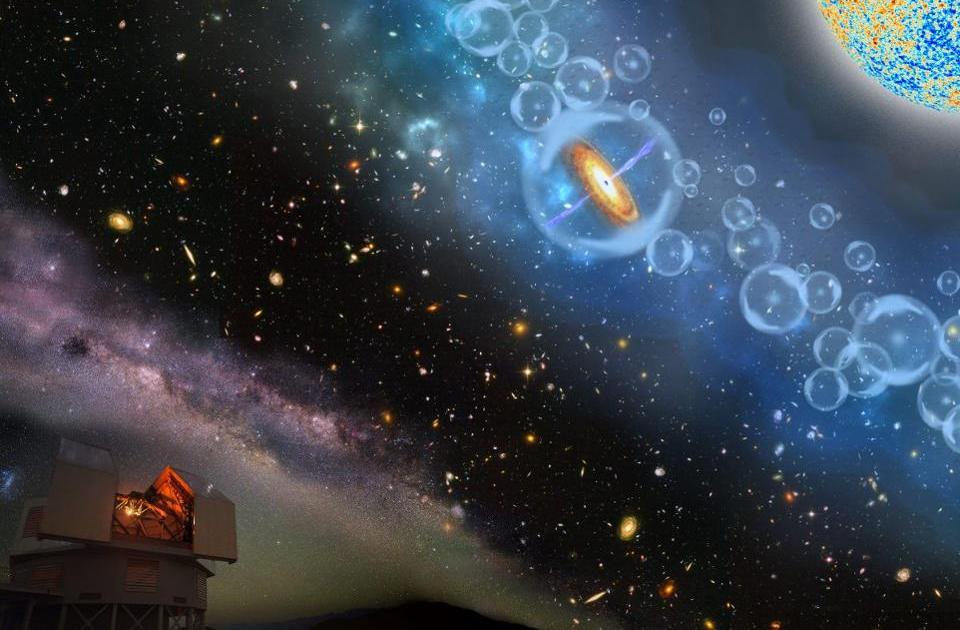Stryder50
Platinum Member
So, per the couple of excerpts to follow;
...
In physical cosmology, the age of the universe is the time elapsed since the Big Bang. Today, astronomers have derived two different measurements of the age of the universe:[1] a measurement based on direct observations of an early state of the universe, which indicate an age of 13.787±0.020 billion years as interpreted with the Lambda-CDM concordance model as of 2018;[2] and a measurement based on the observations of the local, modern universe, which suggest a younger age.[3][4][5]
...

 en.wikipedia.org
~~~~~~~~~~~~~
en.wikipedia.org
~~~~~~~~~~~~~
Before 1999, astronomers had estimated that the age of the universe was between 7 and 20 billion years. But with advances in technology and the development of new techniques we now know the age of the universe is 13.7 billion years, with an uncertainty of only 200 million years. How did this come to be?
....
 imagine.gsfc.nasa.gov
~~~~~~~~~~~~~~~~
imagine.gsfc.nasa.gov
~~~~~~~~~~~~~~~~
Now a light year is the distance light travels in an Earth year time, so one would think the most distant object is about 13.7 billion light years away.
However ...
The Hubble Space Telescope has glimpsed the most distant single star it's ever observed, glimmering 28 billion light-years away. And the star could be between 50 to 500 times more massive than our sun, and millions of times brighter.
...
~~~~~~~~~~~~~~~
Here's the Conundrum;
At 28 billion light years away, this is over twice as old as the Universe.
OR ...
Light from this distant object has somehow found a way to travel faster than the speed of light, just over twice as fast. Yet science claims nothing can travel faster than light, especially light itself.
Inside the article text is this explanation;
...
"When the light that we see from Earendel was emitted, the Universe was less than a billion years old; only 6% of its current age. At that time it was 4 billion lightyears away from the proto-Milky Way, but during the almost 13 billion years it took the light to reach us, the Universe has expanded so that it is now a staggering 28 billion lightyears away."
...
Which makes it sound that somehow the Universe has expanded faster than the speed of light.
Hmmm ????


...
In physical cosmology, the age of the universe is the time elapsed since the Big Bang. Today, astronomers have derived two different measurements of the age of the universe:[1] a measurement based on direct observations of an early state of the universe, which indicate an age of 13.787±0.020 billion years as interpreted with the Lambda-CDM concordance model as of 2018;[2] and a measurement based on the observations of the local, modern universe, which suggest a younger age.[3][4][5]
...

Age of the universe - Wikipedia
Before 1999, astronomers had estimated that the age of the universe was between 7 and 20 billion years. But with advances in technology and the development of new techniques we now know the age of the universe is 13.7 billion years, with an uncertainty of only 200 million years. How did this come to be?
....
Imagine the Universe!
This site is intended for students age 14 and up, and for anyone interested in learning about our universe.
Now a light year is the distance light travels in an Earth year time, so one would think the most distant object is about 13.7 billion light years away.
However ...
Hubble sees most distant star ever, 28 billion light-years away
...The Hubble Space Telescope has glimpsed the most distant single star it's ever observed, glimmering 28 billion light-years away. And the star could be between 50 to 500 times more massive than our sun, and millions of times brighter.
...
~~~~~~~~~~~~~~~
Here's the Conundrum;
At 28 billion light years away, this is over twice as old as the Universe.
OR ...
Light from this distant object has somehow found a way to travel faster than the speed of light, just over twice as fast. Yet science claims nothing can travel faster than light, especially light itself.
Inside the article text is this explanation;
...
"When the light that we see from Earendel was emitted, the Universe was less than a billion years old; only 6% of its current age. At that time it was 4 billion lightyears away from the proto-Milky Way, but during the almost 13 billion years it took the light to reach us, the Universe has expanded so that it is now a staggering 28 billion lightyears away."
...
Which makes it sound that somehow the Universe has expanded faster than the speed of light.
Hmmm ????



